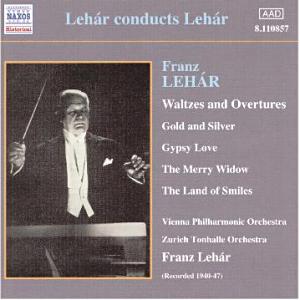Curio Corner
Compilation:
Franz LEHÁR conducts LEHÁR: Waltzes and Overtures
NAXOS 8.110857 [74:35]

Recorded in Zurich in 1947:-
- Musikalische Memoiren, Orchestral Rhapsody (recorded in Vienna 1940)
- The Land of Smiles (Overture)
- Eva (Waltzes)
- Gypsy Love (Overture)
- The Count of Luxembourg (Waltzes)
- The Merry Widow (Overture)
- Viennese Women (Overture)
- Gold and Silver Waltz
Lehar's lovely melodies were often featured in the early days of the cinema. In fact there were three film versions made of his most popular operetta The Merry Widow: in 1925, 1934 (the best version with Maurice Chevalier and Jeanette MacDonald. Richard Tauber one of Lehar's favourite artists is fondly remembered too for a string of popular films including: Blossom Time, Pagliacci and The Lisbon Story
Jonathan Woolf's review below can be read in its entirety over on our sister site MusicWeb:-
Lehár died in the year following these, his last recordings They are performances of such ardour and lyricism that one can only be grateful that Decca had the foresight to catch him in time. They are generally more leisurely than those earlier famous discs when he was the conductor for such Lehár vocal titans as Tauber, Esther Réthy (fellow Hungarian and a Lehár stalwart), Novotná (who'd studied, as had the composer before her, in Prague. He studied harmony and counterpoint with Fibich and Dvořák) and the equally excellent Maria Reining.
The disc actually begins with the relatively rare four sides of Musikalische Memoiren recorded in Vienna in 1940, a sort of dramatic pot-pourri and sixteen plus minutes of richly orchestrated, luxuriantly played confection. The Zurich sides must be sufficiently famous now to need little comment except to note they have a leaner orchestral palette but no less of a sense of occasion and affection. Lehár's increasing slowness is never ponderous; on the contrary he brings marvellous zest and lyrical sweep to, say, the Overture to The Land of Smiles. Viennese Women features an extended piano interlude one of the characters is a piano tuner - and there is a palpable zest and zing to the playing throughout whilst the waltz curls and coils with insinuating beauty. The Waltz from Eva is tinged with a certain melancholy nobility whilst Gypsy Love displays massed violins, swaying rhythms and a Gypsy quintet writ large magnificent peroration as the orchestra returns to the initial surging massing theme. If you want to hear the subtlety of the orchestral principals sample the waltz from The Count of Luxembourg where they are on top form and the violins and cellos phrase with lilting charm.
Notes are succinct and transfers resonant and full of clarity much like Lehár's conducting. This was last around minus the 1940 Viennese discs on a Beulah CD I think. Some may be resistant to Lehárian charm. Not me as ever and always I loved every second of it.
Jonathan Woolf
Ian Lace adds:-
I echo Jonathan's sentiments. Wonderful melodies played with affectionate zest, beautifully shaped, with those accents, lilts and rubati that deliver a delicious nostalgic shiver. A real tonic .
Ian Lace

Return to Index